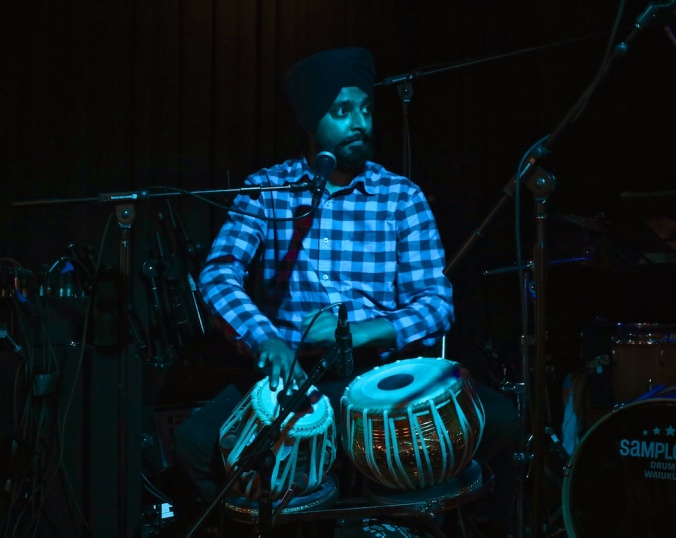 With emerging artists gigs you modify your expectations, but in this case, it was completely unnecessary. Both sets showcased great musicianship and originality. The first set was Manjit Singh and Takadimi; an Indian music/Jazz fusion project. Manjit Singh is not an emerging artist in the strictest sense, he is a highly experienced tabla player, composer and teacher in the two main traditional schools of Indian music (Northern and Carnatic). He has recently been doing a Jazz studies course at the UoA and this project arises from that. The traditional music he teaches is not that dissimilar to Jazz, as it has improvisation aspects and complex interwoven rhythms at its core. Singh also gave us an insight into another tradition, the ecstatic Sufi-influenced music of northwest India, Pakistan and central Asia – Again, a tradition that has fed the rich streams of Indian music and more recently, Jazz.
With emerging artists gigs you modify your expectations, but in this case, it was completely unnecessary. Both sets showcased great musicianship and originality. The first set was Manjit Singh and Takadimi; an Indian music/Jazz fusion project. Manjit Singh is not an emerging artist in the strictest sense, he is a highly experienced tabla player, composer and teacher in the two main traditional schools of Indian music (Northern and Carnatic). He has recently been doing a Jazz studies course at the UoA and this project arises from that. The traditional music he teaches is not that dissimilar to Jazz, as it has improvisation aspects and complex interwoven rhythms at its core. Singh also gave us an insight into another tradition, the ecstatic Sufi-influenced music of northwest India, Pakistan and central Asia – Again, a tradition that has fed the rich streams of Indian music and more recently, Jazz. 
His first number was a Dhafer Youssef composition ‘Odd Elegy’, to my ears the ultimate expression of Jazz, middle eastern fusion. When Singh opened with a Konnakol to establish the metre, the tune took on a more Indian feel and it worked well. This verbal method of laying down rhythmic patterns at the start of a piece has often been adopted by Jazz musicians; notably John McLoughlin and Tigran Hamasyan. The inclusion of a drum kit added to the complexity of the rhythmic structure, but the two percussionists navigated these potentially perilous waters with aplomb (Singh setting the patterns and Ron Samsom working colour and counter rhythms around that).
The rest of Takadimi were younger musicians, but they handled the charts and the improvisational opportunities well. With bass player Denholm Orr anchoring them, the two chordal instruments and saxophone (Markus Fritsch) handled the melodic lines; mostly playing in unison, and in keeping with the music style – relying more on melodic interaction than on harmonic complexity. Michael Howell used his pedals judiciously, winding the reverb and sustain right back, his guitar sounding closer to an Oud. The pianist Nick Dow was a pleasant surprise to me. He had an intuitive feel for this complex music. After ‘Odd Elegy’ we heard an original composition of Singh’s, then a wonderful Trilok Gurtu composition. This project is worthy of continuance – I hope that the talented Manjit Singh builds on what he has begun here.
The second set was guitarist Michael Gianan’s first CJC gigs as a leader. Again you’d hardly have known it. He looked comfortable on the bandstand and this confidence manifested in his playing. He had the finest of Auckland musicians backing him and while this can enhance a performance it can also expose a less experienced player. He fitted into the unit perfectly and the band obviously enjoyed playing his material. His set was nicely paced and offered contrast, but he favoured the stronger numbers – those with bite.

